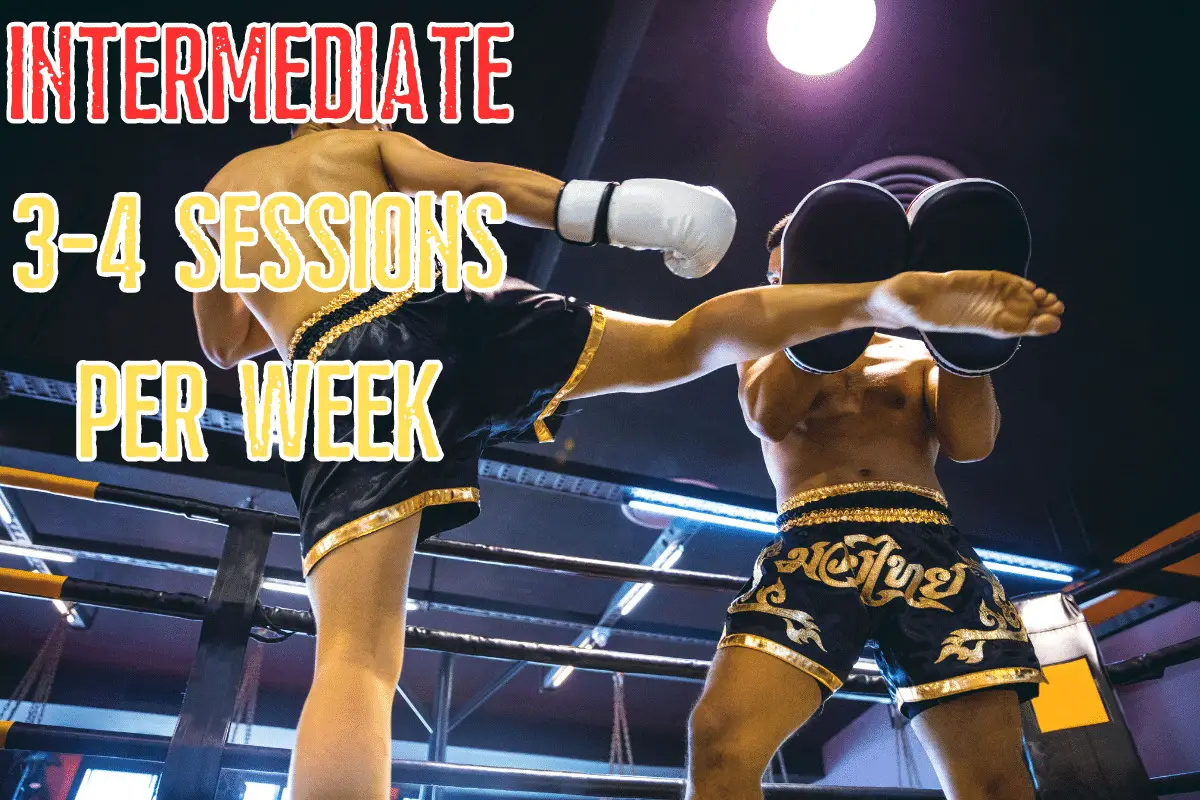Finding the right Muay Thai training frequency is crucial for progress and avoiding burnout. If you overtrain, you’ll lead to faster burnout and overtrained muscles that will be incapable of continuing to train. On the other hand, undertrain and you’ll see no tangible results from your training. So once and for all, how often should you train Muay Thai in a week?
Training Muay Thai more than 4-times per week isn’t generally recommended since it’s more likely to lead to overtraining. However, with qualified coaches that build you a solid training routine, training 5-6 times per week becomes possible. Training under than once a week will likely lead to undertraining, leading to no results.
Answering this question is quite tricky and requires me to know more about you. This is what I’ll do in this article. Regardless of where you are in your Muay Thai journey, I’ll list how many Muay Thai sessions you should have per week to maximize your results. We’ll start with beginners and work our way up to advanced trainees and professional fighters.
I took the inspiration for this article from hearing the same question over and over again. Muay Thai disciples want to avoid overtraining and undertraining. Both can, indeed, be devastating. Therefore, it’s critical we address the frequency at which trainees should train to optimize results.
So without further introduction, let’s dive into the beautiful world of optimizing your Muay Thai training routine.
How Often to Train in Muay Thai
So now, let’s review the training frequency you should use in regard to your skill level. If you’re unable to assess where you’re exactly, which is likely, you can try pushing yourself to the limit and seeing how your body reacts.
The primary point here is to listen to your body, which we’ll review in one of the upcoming sections. If you want to optimize your training routine, it’s time I help you do just that!
Beginners
The first group of trainees we’ll review is beginners. We all started out as beginners, so it’s completely normal if you are one. While I can’t say how long it’ll be until you’re no longer a novice trainee, if you think this applies to you, then follow the instructions in the next paragraph.
If you are new to Muay Thai or have little experience with martial arts or combat sports, it’s essential to allow your body time to adapt. Start with 2 to 3 sessions per week to prevent burnout and reduce the risk of overtraining.
2-3 training sessions per week will provide enough strain and stress on your body to learn optimally. More than that might be too much for your muscles to handle, especially if you’re cross-training, which we’ll also review in an upcoming section; stay tuned for that to learn how to combine Muay Thai with other sports.
If you’re currently a beginner and you want to progress faster and become a more skilled fighter, I wrote a complete Muay Thai guide for beginners, which you should definitely read to optimize your progression.

Intermediate Trainees
The next skill level we’ll review is intermediate. These are fighters with more experience that have already mastered the basics of Muay Thai. Intermediate fighters spar regularly, constantly challenging themselves, and using progressive overload to continue progressing and learning.
Once you have built a solid foundation and are comfortable with the training intensity, you can increase your frequency to 3 to 4 sessions per week. This level of training will help you improve your skills and conditioning.
You’re now capable of training more often, which should be great news for you. While you might not be able to train every single day yet, particularly not under the conditions of a professional, qualified coach, you can train 3-4 times per week; this should be enough for you and provide enough stress on your body to optimize growth.

Advanced Trainees
The last group we’ll review are advanced trainees and professional fighters. These are disciples who have already been training for at least a year and know the art of Muay Thai as if it’s the back of their hands.
If you are an experienced Muay Thai practitioner and actively compete, you might be training up to 5 or 6 times per week. However, it’s crucial to balance intense training with proper rest and recovery to avoid injuries and fatigue.

We’ll now review how you can incorporate rest and recovery, 5-6 Muay Thai sessions per week, and even cross-train, such as lifting weights and running. So let’s dive into the 2nd, and last, part of this article.
How to Avoid Overtraining in Muay Thai
So now, let’s talk about overtraining. In Muay Thai, it’s easy to overtrain for one reason: you’ll likely train in other sports while practicing Muay Thai, which can be dangerous. For instance, I currently do Muay Thai, MMA, run, and lift weights. These are difficult to incorporate without putting too much stress on your muscles.
However, it becomes easy with a professional coach or with any training professional. I would encourage you to seek out a coach, as they’re the most reliable source of information for such issues.
Remember, Muay Thai, in my eyes, is considered a full-body workout. You’ll be using all your muscles to strike and defend yourself while going through a vigorous workout. This can easily lead to overtraining.
Now, I want to review three points that will help you take control of your body and ensure you’re not overtraining, even if you’re doing some type of sport every single day.
#1 – Listen to your body
Regardless of your level, it’s essential to listen to your body. If you feel excessively fatigued, sore, or are experiencing persistent pain, take a day or two off to recover. Overtraining can lead to injuries and hinder your progress in the long run.
This is a key point to understand. Overtraining can hinder your ability to learn and progress, as it disables you from the ability of training. So if you’re currently doing Muay Thai and all you care about is your progression, it’ll be better to miss out on a training session to be 100% you’re fully recovered.
If you notice the following signs, know that there’s a good chance you’re overtrained.
Decreased agility, strength and endurance, such as slower reaction timesand reduced running speeds are all common signs of overtraining. 2. Increased perceived effort during workouts. Not only can overtraining decrease performance, it can also make seemingly effortless workouts feel unusually difficult.
SOURCE
#2 – Cross-Training
Consider incorporating cross-training into your schedule. This could include strength and conditioning workouts, flexibility training, or restorative practices like yoga. A well-rounded training approach can help improve your overall performance and reduce the risk of overuse injuries.
If you only do Muay Thai 6 times per week, you’re much more likely to overtrain yourself compared to if you incorporate stretching, conditioning, and strength training in your weekly training routine.
Cross-training helps ensure you’re using different muscles differently every time you train. Therefore, it becomes harder to overtrain yourself.
Let me tell you what you want to avoid from my experience. I consider myself a fit guy, who’s capable of physically training more than the average person. I’ve been training for more than 7 years now, including in martial arts, lifting weights, distance running, and some other sports.
And still, I overtrained my body by training hard more than once per day. I had days where I had lifted weights for 80 minutes and then went for a 60-minute MMA class, where I did takedowns, throws, ground game, and striking. Eventually, it was too much on my body and I had to stop training for more than a month.
Do avoid training the same muscle groups vigorously without letting them rest in between training sessions.
#3 – Rest & Recovery
Rest and recovery are just as important as training itself. Make sure to get enough sleep, stay hydrated, and nourish your body with a balanced diet.
Sleep is underrated in the martial arts community. Without proper sleep, which is generally considered more than 8 hours a night, you won’t recover and perform as well in your training.
Prioritize recovery and rest just as much as being active and training. Make sure to get enough sleep and let your muscles recover by not using them more than once per day.
After a relatively light workout, your muscles may be able to recover in 24 hours, whereas a more challenging workout might take two to three days. Very intense workouts might take even longer.
SOURCE
Final Words
And that’s it for how many times per week you should do Muay Thai. Hopefully, you took at least a single lesson from this article and are now in a much better position to train optimally while avoiding overtraining.
Your main concern should be to avoid overtraining, especially as a beginner where Muay Thai training is something new and exciting. You’ll get addicted to fighting, as everyone who starts doing martial arts are always more excited than more advanced trainees.
And if you want to read why Muay Thai has no age limit, follow the link.
Here are other articles you’d benefit from reading:

